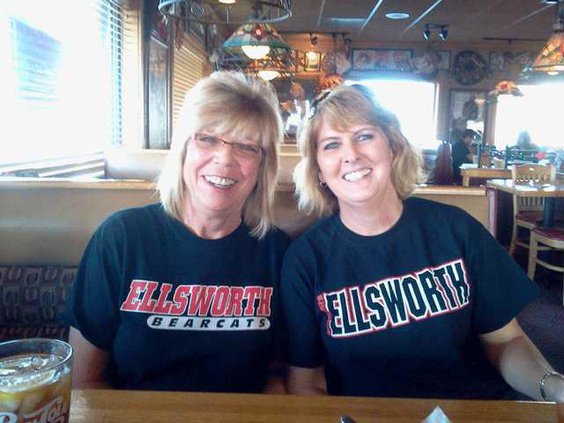For most of the past century, Alzheimer’s patients and their families were advised the disease was something to be managed, not cured. Without medication and cognitive therapy, the debilitating loss of memory eventually progresses until the body forgets to do automatic functions like swallowing, and those effected usually die of secondary diseases caused by a decrease in health. But thanks to people like Hazel Mannik, new options and a new outlook is beginning to come into focus.
“I have used meds to reverse the symptoms and Ballroom Dance to rehabilitate my mind and body,” Mannik writes on her facebook page.
She is the founder of Ambassadors for Alzheimer’s Awareness and the author of Living in My Shadow: My Journey with Alzheimer’s. The book reads like a personal journal, examining her life with the disease from the time of her diagnosis in 1999 to the present--14 years in all. When she was 53, she could not recognize some of her family members. Now, at age 68, Mannik has reversed the memory loss, and continues to battle the disease through ballroom dancing, healthy living and good diet.
Ambassadors for Alzheimer’s Awareness works to promote early diagnosis, use of medication to reverse symptoms, and ballroom dance to rehabilitate the mind and body.
To spread the word, Mannik enlisted the help of volunteer ambassadors around the country who have come to her via her facebook page offering to help. Corinne Lines of Hugoton recently became the Administrator of the organization. Though she has not had any family members with the disease, as a health care professional, she’s witnessed the heartbreak the disease can cause in families close up. Her assistant, Shannon Athen was touched by the disease when her mother began showing symptoms. Together, they began a campaign to visit nursing homes throughout Kansas, talking to administrators and activities directors, sharing the benefits ballroom dance and proper medication can have for those already diagnosed with the disease, and for those who have not yet begun to show signs, but who are at risk in the future.
They started Oct. 27 in Ellsworth. From there, they travelled to Wilson. Last weekend, the two visited Great Bend’s Sterling House, River Bend, Cherry Village and Great Bend Health and Rehabilitation, as well as Woodhaven in Ellinwood. Next weekend, they’ll visit nursing homes in Salina.
“The song Ellsworth 1948 by Rascal Flatts is the reason we picked that town as a starting point,” Lines said. “We wanted to discover what the story was behind the song.” They shared Mannik’s book and her message of hope and the need for a vigilant eye for the early signs of the disease and the need to face it head on.
“In the past, families have been in denial, assuming it was just old age,” Lines said. “Alzheimer’s is not a normal part of the aging process. But, with early diagnosis, some of the symptoms can be reversed and it can be managed.”
They point to Mannik as an example. She continues to live independently and recently returned from a trip to Orlando, Fla. where she attended a book signing on her own.
Heredity is a big factor, Lines said. If someone in the immediate family has or had the disease, others in the family need to be in tune.
Luckily for Mannik, she received early support from her family and her health care team. One of the biggest factors is attitude, Lines said. Mannik and her family reacted to the news with hope and chose to live and keep fighting every day. Too often, when confronted with Alzheimer’s, its a mixed bag of reactions. At nursing homes, some staff are turned off by the disease, believing there is nothing to be done about it, Lines said. But scientists have confirmed that keeping the mind active can help keep the progress of the disease at bay, and recent discoveries that Alzheimer’s is so similar to Diabetes that it may soon be considered Type 3 Diabetes could mean new treatments and ways to prevent the disease could be on the way.
And it can’t happen too soon. Today, there are at least 4 million Americans diagnosed with the disease, and that number is only anticipated to go up in the next two decades, Lines said.
Studies by the Alzheimer’s Association found ballroom dancing offers unique benefits. In the Alzheimer’s Association’s Bronx Aging Study, doctors found cognitive activities that help strengthen concentration can help slow the disease. In addition to physical exercise, ballroom dancing is a cognitive activity that requires concentration. “Ballroom dancing involves precise physical activity, listening to the music, remembering dance steps, and taking your partner into account, which is very mentally testing,” said Dr. Joe Verghese who led the 21-year study. Keeping the mind and body active are key steps to take in treatment.
According to an Oct. 8 story by Deborah Kotz of the Boston Globe, “A large body of research has accumulated in recent years connecting (Alzheimer’s and Diabetes), and both have risen precipitously in the population — with a declining age of onset — along with obesity. Clinical trials have also tested the diabetes drug rosiglitazone (Avandia) for the treatment of Alzheimer’s, though with mixed results.”
Mannik’s goal through the Ambassadors of Alzheimer’s Awareness is to eventually see that every county has a good, strong Alzheimer’s support group in place, and for nursing homes and senior centers to include ballroom dancing as a fun activity open to all seniors in order to manage and prevent the disease.”
Mannik also hopes to inspire others facing Alzheimer’s with her book. She is self-marketing in order to ensure all proceeds from sales go to benefit the AA to support research for treatments and a cure. She can be reached through facebook at https://www.facebook.com/ambassadorsforalzheimersawareness.
(To listen to and view Rascal Flatt's song Ellsworth, go to http://www.youtube.com/watch?v=3vGLiUKHuf0 )
Ambassadors share hope for Alzheimers





